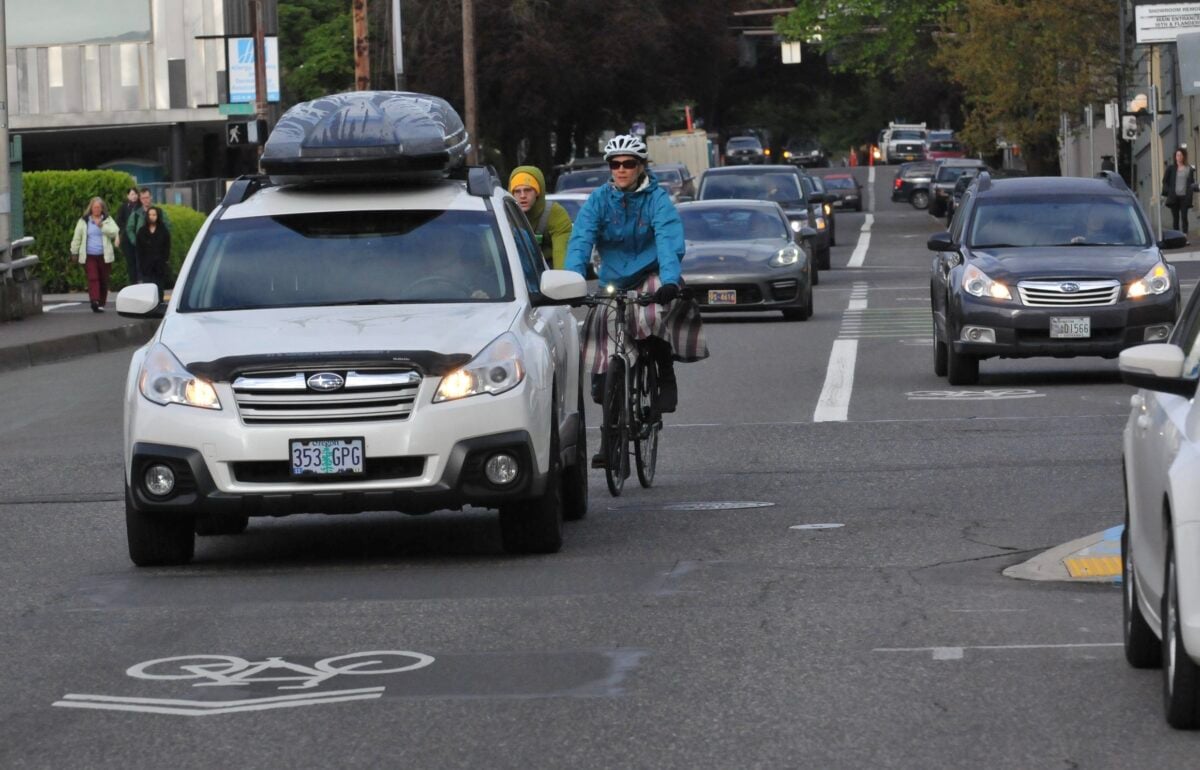
(Photo: Jonathan Maus/BikePortland)
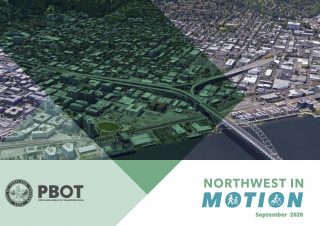
This Thursday (10/8) at 2:00 pm, Mayor Ted Wheeler and the four commissioners will hear a presentation on Northwest in Motion. We’ve published eight stories on the plan since May 2018 and now it’s time to get it passed and implemented.
Local bike advocacy group Bike Loud PDX supports the plan and is encouraging their members to testify at council. They sent out the email below to their supporters yesterday explaining why it’s worth getting behind:
PBOT is planning to install 17 new diverters across the district within the next two years, in addition to many crossing improvements on busier streets. With these sensible, inexpensive changes, PBOT expects biking to double within five years, an impressive achievement that shows some ambition. This plan is also piloting several exciting programs for “self-enforcing” streets through district-wide traffic calming measures, a more equitable way to keep our streets safe without the use of law enforcement.
Advertisement
What’s great about Northwest in Motion?
→ PBOT is moving fast! All phase one diverters (there are 17 of them!) will be installed within two years, and most within one year.
→ For a modest $2.5 million investment in neighborhood greenways, bike riding is projected to nearly double, from the current 8% to 14%.
→ We have a chance to correct long standing inequities. NW Portland has had a failing greenway system for years, despite the many residents who have low incomes, are renters, or have no access to cars. NW Portland was ranked as one of the worst areas in the city for excessively high vehicle counts on neighborhood greenways in 2015, and none met standards for All Ages and Abilities.
… NW Portland won’t get another chance for quality transportation investments like this one for a while, so we need to make it count.
If you’d like to testify at the Council meeting Thursday, you’ll need to register via this Zoom link by today (10/6) at 4:00 pm.
— Jonathan Maus: (503) 706-8804, @jonathan_maus on Twitter and jonathan@bikeportland.org
— Get our headlines delivered to your inbox.
— Support this independent community media outlet with a one-time contribution or monthly subscription.



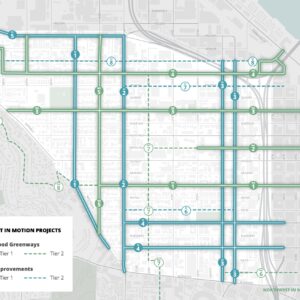
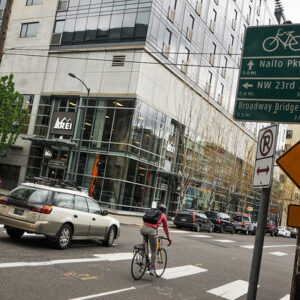

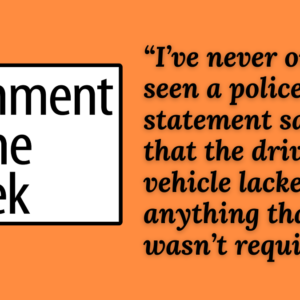
Thanks for reading.
BikePortland has served this community with independent community journalism since 2005. We rely on subscriptions from readers like you to survive. Your financial support is vital in keeping this valuable resource alive and well.
Please subscribe today to strengthen and expand our work.
Let’s learn from the mistakes made in the public input processes for the development of both the Clinton Greenway and the Ladd-Harrison-Lincoln Greenway.
In both instances, the City handled public input in a way that pitted neighbor-against-neighbor.
https://bikeportland.org/2017/12/05/reports-pbots-lincoln-harrison-greenway-meeting-goes-off-the-rails-258800
https://bikeportland.org/2018/02/09/new-friends-of-safer-lincoln-group-hits-the-street-to-defend-a-greenway-267353
Let’s not do that with Northwest In Motion.
In my neighborhood, the public processes on both Clinton and Lincoln Greenways devolved into out-of-control contentious meetings where some people were silenced. It hindered the projects, making them more drawn-out and expensive, and was hurtful to neighborhood relationships. It damaged community, which we should be doing everything we can to preserve and build, especially now.
NWIM should proceed in a way that is consistent with City transportation priorities, national standards, Vision Zero guidelines, and other principled, fact-based solutions designed by experts to address local and global issues. These policies are already in place and the City should act like it.
The City needs to have the backbone to make it clear that they are doing this project, instead of tasking volunteer citizen advocates with fighting a largely symbolic battle with those who are against it.
Let people know that their choice is whether they participate in the detailed project planning, not whether the project proceeds.
Both opponents and advocates can serve as valuable consultants on NWIM. PBOT should genuinely treat them that way.
This is absolutely correct:
I’ve seen these sorts of processes devolve into unhelpful fights for no reason in my time as an advocate in San Diego. The city (speaking of Portland now) must have political will to do the right thing and get the project going with the input of its community members.
The City has done extensive public discussion of the NWIM plan, going back at least a year.
…and so I am assuming you would be in favor of ODOT taking the same approach to I-5 expansion? You think ODOT should just “get a backbone” and tell everyone “they are doing project”?
It sounds like you are blaming PBOT for making those other projects contentious. The discourse devolved because there were two opposing viewpoints and neither wanted to compromise.
No matter how you ask for public input, those that are not in favor will use the public involvement process to object and attempt to derail the process in hopes the project wont happen.
It is easy to say that people should “get on board” when you agree with a project, but you had better be prepared for someone saying that to you the next time a project you oppose comes around.
No. Because unlike the I-5 expansion, the projects in NW in Motion are in complete alignment with multiple adopted plans and they match with sensible and humane engineering and planning best practices.
Also, PBOT is relatively trustworthy based on their record. Whereas ODOT is completely rogue and untrustworthy based on theirs.
I understand where you are coming from and do not disagree. I can only hope you can see that some of your arguments are fairly subjective (sensible and humane) and just because someone else’s views do not align with your’s does not mean they should be told “that their choice is whether they participate in the detailed project planning, not whether the project proceeds.”
My concern is not with the projects themselves, it is the suggestion that those that disagree should not be heard and considered.
If someone can show severe negative climate and health impacts of NWIM, PBOT SHOULD listen to them.
Thanks Ted G.,
Keep in mind I’ve spent my entire journalism and advocacy career respecting and listening to people I disagree with and making sure they have a platform to share their views (proof is all on the record in these archives). My point is that when someone is sharing opinions or views that are not backed by policy that has been officially adopted and/or is clearly not the best practice, they should not be given the same amount of influence over projects and policies. Absolutely listen to them and engage with them, but hold the line firmly about what we’ve already adopted as goals and plans.
You make a good point Ted G., and I am glad you brought it up here publicly. It is an obvious contradiction and one I’ve struggled with.
I agree with the points made by Jonathan and cmh89 here, but want to acknowledge my errors and explain my point more clearly.
I regret using the word the “backbone”. It is an insult to the dedicated transportation staff who conduct mandatory public input meetings.
Nevertheless, I’ve witnessed more than one meeting at which neighbors fight with each other while PBOT staff stand by mute and at a loss.
Proponents can end up feeling like PBOT relies on them to justify and sell their project. They then get blamed for it by their neighbors (e.g., vilifying “entitled bicyclists” for bicycle infrastructure projects). Meanwhile, opponents, after all their time and effort, can feel resentful that they’ve just been played as they see their comments ignored and the project get built anyway.
I want to encourage transportation staff and public officials to go into these meetings with the tools to move the discussion from positional to principled, with a true aim of actually eliciting productive input from both sides.
I’m glad you picked the I-5 Rose Quarter project for your example. I oppose freeway expansion and hope this one never gets built. Yet I have spent years of my life participating in public input on the details of the surface street changes affecting active transportation and land use. I encourage all freeway expansion opponents to do the same. If it does get built, we don’t want to give up our opportunity to get something good out of it, or at least, to reduce the harm.
All this being said, it sounds like on this particular project, NWIM, staff and volunteer CAC members have already done a pretty good job in these respects, and that now we are just letting public officials know they have the support to proceed. I’m feeling a little like a vice presidential candidate using the debate stage to soapbox my talking points without addressing the question asked. I should have simply said, “I support NWIM.” and why.
I was on the Community Advisory Committee and participated in many conversations about various aspects of the NWIM plan. I strongly support it. Thank you BikePortland for your ongoing coverage.